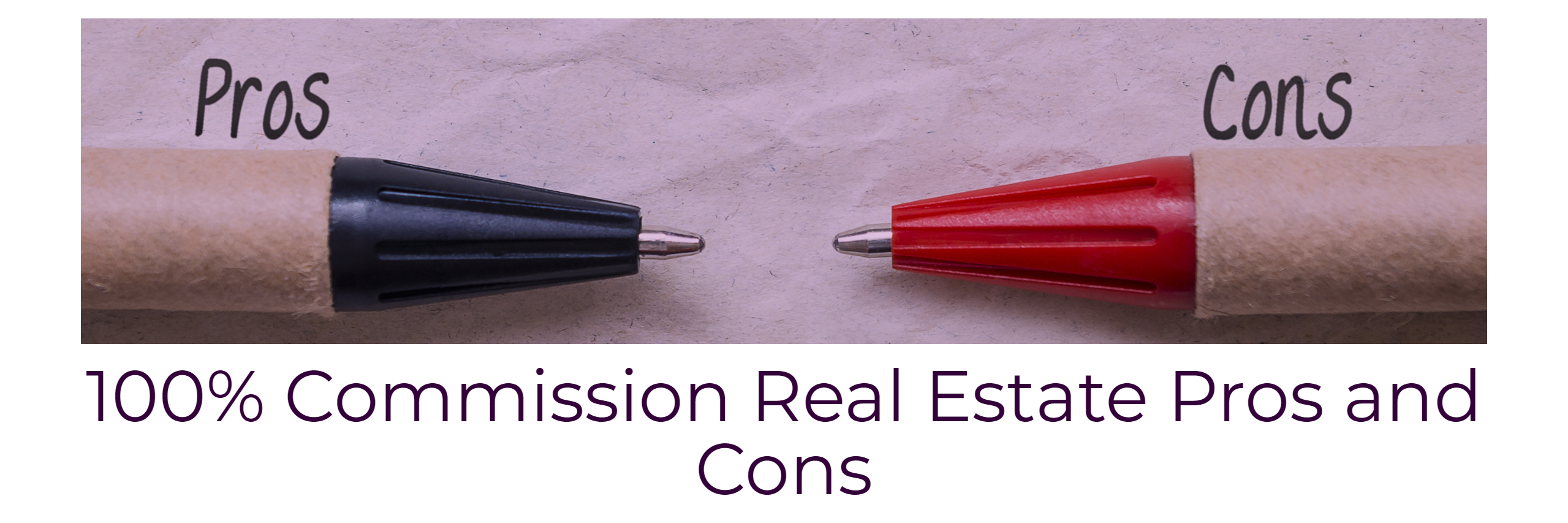[mashshare]
Have you thought about going to a split where you earn more money? Do you want to know the 100% Commission Real Estate Pros and Cons? 100% commission real estate pros and cons begins by comparing them to traditional brokerages.
1) Do the math.
In a traditional real estate brokerage model commissions split from 50% to 80% for the agent depending upon the company.
Example:
If an agent earns a $10,000 commission, and the commission split is 50/50, the agent keeps $5,000. In an 80/20 split, the agent keeps $8,000. With many 100% commission brokerages, a flat per transaction fee may be paid such as $600. In that scenario, the 100% commission agent keeps $9,400. Far better than any of the splits mentioned above. However, not every 100% commission office charges the same fees. While many use a per transaction fee, others may charge a lower fee but also charge an additional monthly fee (called a desk fee). Some may only charge an annual fee. Read about different brokerage fees below to better understand 100% commission real estate pros and cons.
2) 100% Commission Real Estate Are Gaining Popularity…
While 100% commission real estate offices have been around for many years, their popularity only recently increased. That’s due to using modern technology with services like DocuSign offering electronically signed (e-signatures) for legal documents. Removing the required paperwork outside of the real estate office changed the real estate industry. This enabled real estate agents greater independence without relying on typical office infrastructures and support. Modern technology provides real estate agents with independence making 100% commission brokerages popular.
3) MLS Data Exclusivity
Up until only a few years ago, MLS data was only available through member offices. Now, much of the MLS data can be accessed from private websites. Buyers and sellers also access MLS data easier online nowadays. 100% commission real estate pros and cons includes public access to MLS data making traditional real estate brokers MLS monopoly obsolete.
4) Work at Home Popularity
100% commission real estate pros and cons must consider the rising popularity of 100% commission agents. Two important reasons for the work at home popularity:
- Offices are no longer needed for meeting clients.
- Online access exists for all of the essential tools required by agents.
How 100% Real Estate Brokerages Differ
A 100% commission realty also requires looking at what individual brokerages offer. Some 100% companies provide more benefits than others.
Consider these pros and cons when deciding to join a 100% commission real estate brokerage:
1. Stability
Real estate markets constantly change. Over the years, some markets experience fast growth while others slide into a downturn. Then, the climate changes making some markets hotter than others. Today’s hottest property markets may turn cold tomorrow. The ability for a real estate brokerage to weather the storm during downturn times matters. According to a recent report, many new real estate companies close within two years. Others keep floating through the good and bad times. Will the 100% commission brokerage you think of joining provide stability?
2. Costs
100% commission real estate pros and cons also consider costs. As explained above, not every 100% commission real estate broker charges the same fees. The three most popular fees include:
- Flat Fee per Closing;
- Monthly “Desk” Fee; and
- Yearly Fee
Each option has its pros and cons dependent on the agent’s production level.
3. Hidden Fees
100% commission real estate pros and cons also consider hidden fees. Here is where the biggest difference between realty brokerages shows. The hidden fees need to be explained before jumping ship from one brokerage to another. Typically hidden fees include:
- Administrative Fee
- Compliance Fee
- E&O Fee
- File Review Fee
- Franchise Fee
- Technology Fee
- Training Fee
4. History
Also mentioned above, is the fact that new real estate brokerages often close within two years. Many startups don’t take into consideration all of the overhead costs compared to the income. Shortfalls occur and reserves dry up leaving the broker with no alternative than to close the doors. Inquire about the history of the brokerage to determine whether they withstood the bad market times along with the good ones. Stability over a long period of time counts heavily towards predicting future success.
5. Leadership
How popular is the broker? Does he or she maintain a good professional reputation? Consider what achievements, professional certifications, honors, and community recognition the broker possesses. What does the local media say about the broker? How about social media reputation? Look towards the future. Will this broker lead you towards innovation, keep up with modern technology and lead you into a successful future?
6. Insurance
Errors & Omissions Insurance (E&O) coverage for the brokerage and its agents is mandatory. But, not every insurance policy provides the same benefits. Consider what the brokerage insurance policy includes such as:
- Coverage Amount
- Coverages (What is Covered)
- Deductible
- Exclusions
- All Other Perils (AOP) Coverage
- Insurer Representation
Look for ultimate protection in case of a lawsuit. Seek high coverages and low deductibles. Obtain All-Inclusive Coverage with Quality Representation.
7. Support
Some 100% brokers just collect checks and do nothing else. An inaccessible broker provides the agents no favors. Inexperienced brokers don’t know how to provide support to their agents. California licensing laws don’t require highly experienced brokers. Look into the amount and quality of accessibility and support the brokerage gives to its agents.
8. Technology
The infrastructure of a modern brokerage determines the efficiency of conducting business. Having to email your contracts to your broker should frighten you. Learning what modern technology tools your broker provides indicates whether the brokerage supports your growth.
9. Strategic Partners
Brokerages often partner with service providers and suppliers in order to control costs. Expect the best services and products. Don’t rely on a company who won a bidding war to get the service provider contract from your broker. Don’t let the bottom line reduce you and your clients’ needs.
10. Brand Name
Join a 100% brokerage with a good brand name. Never get caught meeting a new client who questions the legitimacy of your realty company. Do you want to associate with a “Z” realty company or an “A” brand name image that consumers like and trust? Don’t be afraid of small companies. Boutique brokerages achieve success due to the marketing of their brand name and reputation. Brand marketing allows small companies to thrive based on their excellent reputation.










